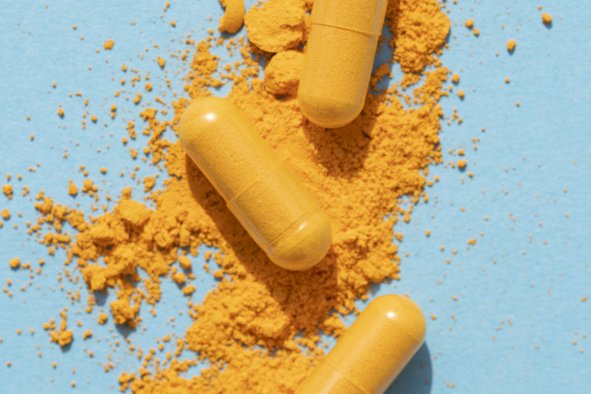A popular sugar substitute may increase the risks of heart attacks and stroke, new research has found.
The artificial sweetener erythritol may make the platelets in our blood more active, making blood clots and subsequent health issues more common, according to a new paper in the journal Arteriosclerosis, Thrombosis and Vascular Biology.
The researchers suggest that these findings mean that sweeteners like erythritol may not be as safe for our health as previously thought.
"This research raises some concerns that a standard serving of an erythritol-sweetened food or beverage may acutely stimulate a direct clot-forming effect," study co-author W. H. Wilson Tang, research director for Heart Failure and Cardiac Transplantation Medicine at Cleveland Clinic, said in a statement.
"Erythritol and other sugar alcohols that are commonly used as sugar substitutes should be evaluated for potential long-term health effects especially when such effects are not seen with glucose itself."
Erythritol is a low-calorie, low-glycemic sweetener that is commonly used as a sugar substitute in a variety of food and beverage products, including soda, dairy products, and stevia sweeteners. It's naturally found in some fruit and veg, and made inside the human body in tiny amounts during the breakdown of glucose.
Per unit weight, erythritol is 70 percent as sweet as sugar with only 6 percent of the calories. After consumption, erythritol is mostly passed out in the urine, but may accumulate in the body.
Both the U.S. Food and Drug Administration and the European Food Safety Authority classify erythritol as a GRAS ("generally recognized as safe") ingredient, meaning that it can be freely used in food and drink products. However, the researchers state that this may need to be re-evaluated due to these recent discoveries.
The researchers discovered that in healthy people, erythritol levels in the blood climbed by over 1,000 times in those who had consumed food containing the sweetener compared to those who had not. They also found that there was a significant increase in blood clot formation after consuming erythritol which was not seen after eating glucose.
When you get a cut or injury, tiny cell fragments in your blood called platelets rush to the site of the injury, sticking to the damaged area and to each other, forming a small, temporary plug. The platelets release chemicals that signal proteins in your blood to create long strands called fibrin, which weaves through the platelets, forming a net that traps more platelets and red blood cells, creating a stable and solid blood clot.
Clots are essential to wound healing, but if they block blood flow to essential parts of the body, they can cause heart attacks and strokes.
"Many professional societies and clinicians routinely recommend that people at high cardiovascular risk, those with obesity, diabetes or metabolic syndrome, consume foods that contain sugar substitutes rather than sugar," study co-author Stanley Hazen, chair of Cardiovascular and Metabolic Sciences in Cleveland Clinic's Lerner Research Institute, said in the statement.
"These findings underscore the importance of further long-term clinical studies to assess the cardiovascular safety of erythritol and other sugar substitutes."
This research follows studies the group published last year, which found that cardiac patients with higher erythritol levels were much more likely to experience a major cardiac event in the following years, and that adding erythritol to blood increased clot formation.
Other studies have also found several health impacts from other commonly used artificial sweeteners.
Aspartame has been found to cause a range of health problems, including type 2 diabetes, obesity, mood and behavioral disorders, hormonal disruption, spatial learning, and memory deficits, while sucralose has been linked to gut cell damage.
"There are many natural and synthetic low-calorie sweeteners available, and each has a unique chemical structure," Lindsey Schier, a biology professor at the University of South Carolina, previously told Newsweek.
"This means that each low-calorie sweetener may interact with the cells in our body in different ways, which ultimately determines their specific biological consequences," Schier added. "More research studies are needed to continue to understand how they may impact health, especially when they are used over a long period of time."
Another sweetener named xylitol was also recently found by these same researchers to also affect blood clot formation, and is associated with increased risk of heart attack and stroke.
"I feel that choosing sugar-sweetened treats occasionally and in small amounts would be preferable to consuming drinks and foods sweetened with these sugar alcohols, especially for people at elevated risk of thrombosis such as those with heart disease, diabetes or metabolic syndrome," Hazen said.
"Cardiovascular disease builds over time, and heart disease is the leading cause of death globally. We need to make sure the foods we eat aren't hidden contributors."
The researchers conclude by noting that more research into the impacts of erythritol needs to be done, and that it may need to be reevaluated as a safe ingredient.
"Combined with recent large-scale clinical observational studies and mechanistic cell-based and animal model studies, the present findings suggest that discussion of whether erythritol should be reevaluated as a food additive with the Generally Recognized as Safe designation is warranted," they wrote in the paper.
References
Witkowski, M., Wilcox, J., Province, V., Wang, Z., Nemet, I., Tang, W. H. W., & Hazen, S. L. (2024). Ingestion of the Non-Nutritive Sweetener Erythritol, but Not Glucose, Enhances Platelet Reactivity and Thrombosis Potential in Healthy Volunteers. Arteriosclerosis, Thrombosis, and Vascular Biology. https://www.ahajournals.org/doi/10.1161/ATVBAHA.124.321019
Disclaimer: The copyright of this article belongs to the original author. Reposting this article is solely for the purpose of information dissemination and does not constitute any investment advice. If there is any infringement, please contact us immediately. We will make corrections or deletions as necessary. Thank you.



